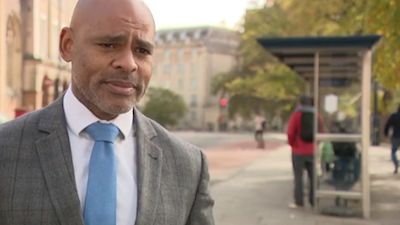Ongoing row sees local democracy reporter excluded from Bristol Mayor's press briefings

Watch the press briefing which has gone viral - video credit: Bristol City Council
A local democracy reporter has been widely praised for asking questions about the Bristol Mayor’s overseas travel, after a video clip from the briefing went viral.
Alex Seabrook, whose role within the Local Democracy Reporter Service (LDRS) is funded by the BBC, quizzed Marvin Rees about his decision to fly to Canada to speak at a TED event promoting climate change.
But Alex was challenged during the press conference over his right to ask questions on the subject by a council communications officer.
Bristol City Council has now reiterated that local democracy reporters are not welcome to attend the mayor’s fortnightly media briefings.
A video from the meeting went viral on Twitter earlier this week, with widespread support for Alex and the scheme from local and national journalists.
ITV West Country has joined other media organisations in deciding not to attend or cover any of the mayoral briefings until this ban is lifted.
Ian Axton, Head of News at ITV West Country said “ ITV News West Country stands by other media organisations on this issue.
"We will not attend the fortnightly press briefings held by the Mayor until the exclusion of Local Democracy Reporters is lifted. “
During this month’s online briefing, Alex Seabrook had asked Mr Rees whether he saw any irony in flying to Vancouver to give a 15-minute TED talk on climate change.
But before answering, the council’s communication manager, Saskia Konynenburg, asked whether it was within the LDR's remit to ask the question.
She said: “My question is Marvin was fully-funded by TED to attend so I couldn’t quite understand what the role as an LDR would be in asking that question. I think it is probably for a journalist from a newspaper but I can’t quite see the link to LDR.”
The mayor currently holds regular media Q&As but since the incident, the LDRs have been told they are not welcome to attend.
The Local Democracy Reporting Service is a BBC-funded scheme with reporters given a remit to cover local authorities and elected bodies in a set region, providing the articles to other partners in the scheme.
BristolLive and Bristol Post editor Pete Gavan said: “The LDR service is a vital piece of the journalism we offer to the city and the surrounding area.
"I give my wholehearted backing and support to both the Bristol LDRs and the great work they do holding the local authority to account.
“It’s absolutely vital that the BBC-funded reporters who make up the team locally are able to carry out their remit without interference."
“Bristol is fortunate to be served by many different news outlets, which will have different priorities and audiences.
“The service that the LDRs provide is one which can be accessed by all partners. We believe it is an important shared resource and we are very concerned by the long-term implications of councils choosing to exclude reporters.”
Matthew Barraclough, head of the BBC’s Local News Partnership, which oversees the public interest scheme, expressed his support.
Writing on Twitter, he said: “This tweet [the video of the meeting] makes the case for the Local Democracy Reporting Service in a nutshell. Without LDRs working hard on behalf of local news media and their audiences, these “comms bosses” can control the narrative.”
Bristol City Council has defended its position, and a spokesperson said: “Any suggestion that LDR attendance has been barred as a result of recent reporting is completely false, and we continue to work day-to-day with LDRs in support of their role.
"All mainstream local media outlets are invited to the Mayor’s media briefings.
"There has been a long-standing mutual agreement between the Mayor’s Office and the Post about personnel attending press conferences whenever they are announced and held, and that LDR’s would not be sent due to the narrow definition of their role as an impartial service.”
Credit: Local Democracy Reporter Service/Yakub Qureshi